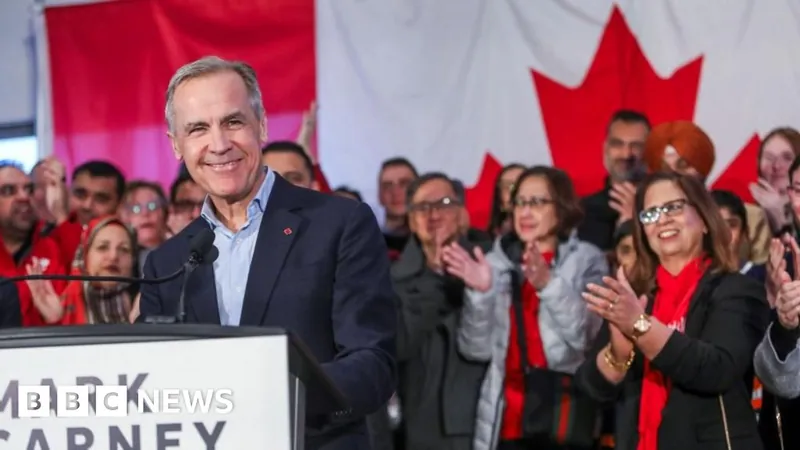
Mark Carney Joins the Race for Canada's Liberal Party Leadership – What This Could Mean for the Future of Canadian Politics!
2025-01-17
Author: Jessica Wong
In a move that has sent ripples through the political landscape, Mark Carney, the former governor of the Bank of Canada and the Bank of England, has officially declared his candidacy for the leadership of Canada’s Liberal Party. This announcement comes after months of speculation regarding his political ambitions, with many believing he could be a strong contender to succeed Prime Minister Justin Trudeau.
Carney kicked off his campaign in a nostalgic setting—his hometown of Edmonton, Alberta—at a local hockey rink where he spent many childhood days learning to skate. Addressing supporters, he stated, “I’m in this race because Canada is the best country in the world, but it could be even better.” His words resonate with those who believe in Canada’s potential for greater achievements.
At 59, Carney stands poised to take the reins of a party that has been facing challenges under Trudeau's leadership. Trudeau, after serving nine years, recently announced his intentions to step down once a new party leader is elected. The timing of this leadership race is crucial, as the next general election looms, scheduled for no later than October of this year and potentially as soon as spring.
What sets Carney apart in this political contest is not only his impressive financial credentials, but also the fact that he is the only candidate in the Liberal Party leadership race who does not currently hold an elected position in Trudeau’s government. By positioning himself as an outsider, Carney aims to bring a fresh perspective to the party’s leadership.
In his campaign launch, he outlined several pressing issues that Canada faces, including a housing affordability crisis, stagnant wages, and the urgent threat of climate change. He conveyed a sense of urgency, stating, “Too many people are falling behind.” With the recent election of US President Donald Trump, who has hinted at imposing significant tariffs on Canadian goods, Carney underscored the challenges ahead for Canada's economy.
Armed with a robust educational background from Harvard and Oxford, Carney brings significant economic experience to the table. His tenure as Canada’s central banker saw him navigate the nation through the financial crisis, becoming the first G7 central banker to raise interest rates as countries began their recovery. Following his time in Canada, Carney led the Bank of England during crucial moments, including the economic fallout from Brexit.
Moreover, Carney has positioned himself as a champion for environmental sustainability. As a UN Special Envoy for Climate Change and the founder of the Glasgow Financial Alliance for Net Zero, he has pushed for financial institutions to combat climate change actively.
During his announcement, Carney criticized Trudeau’s management of the economy, suggesting that the prime minister has diverted attention from vital economic issues. “I know I’m not the only Liberal in Canada who believes that the prime minister and his team let their attention wander from the economy too often,” he remarked.
Carney faces stiff competition from within the party, notably from former finance minister Chrystia Freeland, who is also expected to declare her candidacy soon. Freeland’s resignation from her cabinet role in December indicated her dissatisfaction with Trudeau's leadership, particularly around fiscal matters.
As the Liberal leadership race heats up, the winner will need to prepare for a fierce showdown against the opposition Conservatives, led by Pierre Poilievre. With current polls showing the Conservatives in a strong position, the stakes are higher than ever. Carney has called into question Poilievre's policies, deeming them “naïve” and “dangerous,” while also bracing himself for the criticism that he is merely an extension of Trudeau’s unpopular administration.
Interestingly, while Carney has been an advocate for carbon pricing—Trudeau's flagship climate policy—he has begun to reassess his stance. Recently, he suggested that the carbon tax should be replaced with an alternative approach that could achieve similar climate goals without putting a financial strain on Canadians.
The next Liberal Party leader will be elected on March 9, with critical implications for Canada’s forthcoming elections. As Carney embarks on this ambitious journey, the Canadian political landscape could undergo significant changes—one that voters will be keenly observing. Can Carney prove to be the transformative leader that Canada needs? Only time will tell!


 Brasil (PT)
Brasil (PT)
 Canada (EN)
Canada (EN)
 Chile (ES)
Chile (ES)
 Česko (CS)
Česko (CS)
 대한민국 (KO)
대한민국 (KO)
 España (ES)
España (ES)
 France (FR)
France (FR)
 Hong Kong (EN)
Hong Kong (EN)
 Italia (IT)
Italia (IT)
 日本 (JA)
日本 (JA)
 Magyarország (HU)
Magyarország (HU)
 Norge (NO)
Norge (NO)
 Polska (PL)
Polska (PL)
 Schweiz (DE)
Schweiz (DE)
 Singapore (EN)
Singapore (EN)
 Sverige (SV)
Sverige (SV)
 Suomi (FI)
Suomi (FI)
 Türkiye (TR)
Türkiye (TR)
 الإمارات العربية المتحدة (AR)
الإمارات العربية المتحدة (AR)